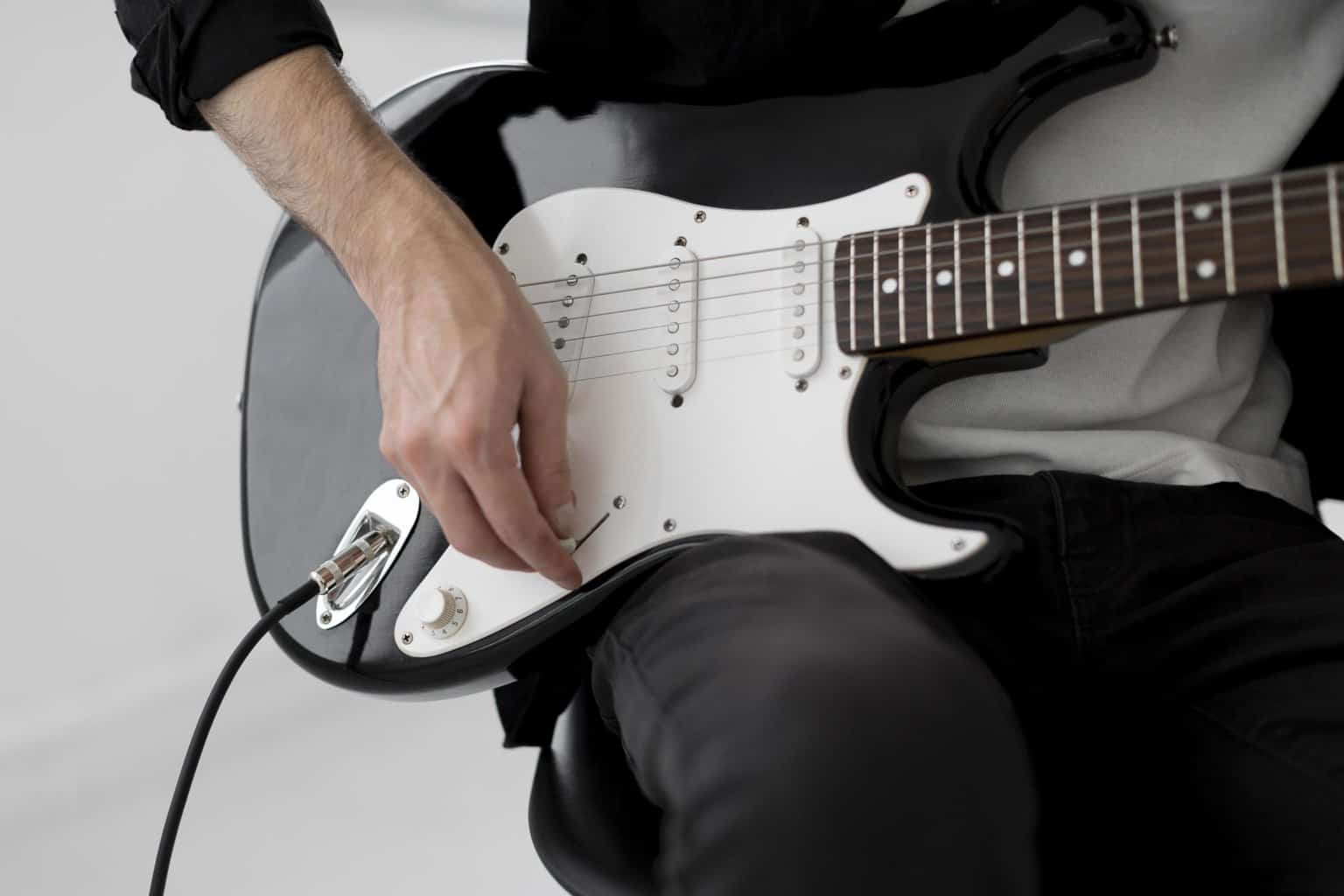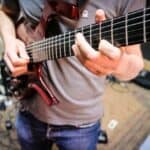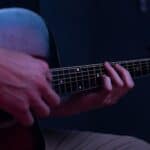Oh, playing the guitar… How cool do guitarists look when they do their thing.
But I could never be one of them. I’m just too busy.
I can’t find the time to take lessons, and teachers nowadays are so expensive.
Hey, psst!
Yes, over here, in the article you googled and are now reading.
Did you know that you can actually learn how to play the guitar without ever meeting an instructor?
I’m not saying that it’s easy or that you won’t get some things wrong, but it’s possible.
In the modern era, there are lots of resources that we, older guitar newbies, didn’t have and that you can leverage to give this amazing instrument a try.
I think the 7 most effective ways to learn the guitar without taking classes are:
- YouTube
- Online courses
- Playing over songs
- Books
- Tablatures and chord schemas
- Having a guitar mentor
- Starting a band
In this article, I will try to answer all the main questions you might have if you are wondering about taking on the guitar by yourself.
I will talk about what I think are the most valuable resources to learn guitar at home, their advantages, and their shortcomings.
After reading this article you will have a clearer idea about what it takes to learn this instrument on your own.
Are you ready to get started?
Let’s go!
Is it too hard to learn guitar alone?
Playing the guitar looks easier than it is. This is something you might already know if you borrowed a guitar at a party anytime and found out that it’s almost impossible to get a nice sound out of it if you don’t know what you are doing.
Learning the guitar is actually not that hard, but you have to know that the first month or 2 are painful. Not that much for your fingers, although until you develop callouses they might hurt a bit, but for your loved ones and those who will listen to you murdering basic chords for hours.
The first stretch of your beginner’s journey is the most critical one. Here is where most people drop out. You see, until you can grasp the basics you will be limited to simple exercises and it’s not that likely that you could play anything resembling music.
After you have your first chords going on, it will start getting more enjoyable. However, practicing or studying for most people is not a funny thing to do.
People who succeed at learning the guitar, or any other instrument, to whatever degree they set their goals are people with patience and grit.
You can’t learn an instrument in a week.
It will take time, frustration, and dedication, but anyone can do it. I really mean it.
Learning on your own will mean that you don’t have the pressure of having to show your teacher your progress every week and that you won’t have someone to set realistic goals for you.
You will need to make up for this and try to track your progress, perhaps by learning new songs monthly to keep you challenged.
Another drawback of not having a teacher is that you will probably develop bad habits in your technique and no one will be there to correct them, but nobody has died from this as far as I know.
7 ways to learn guitar without classes
There are many resources, especially online, to give your first steps while playing the guitar. None of these is absolute and I recommend you find which one suits your personality better. Different people have different necessities, facilities, and possibilities. However, I encourage you to give as many resources as you can at least a try.
Here are 7 ways to learn the guitar without classes:
1. YouTube
YouTube is an amazing resource for learning just anything. The guitar is no exception. On this platform, you can find tutorials for almost any song you could think of. However, I advise you don’t start with specific songs as much as you want it.
Look for beginner lessons that just teach you the basics. Believe me, you need to build your skills from the ground up.
After you have a rather solid ground knowledge of the instrument you could advance into the music that interests you.
2. Online courses
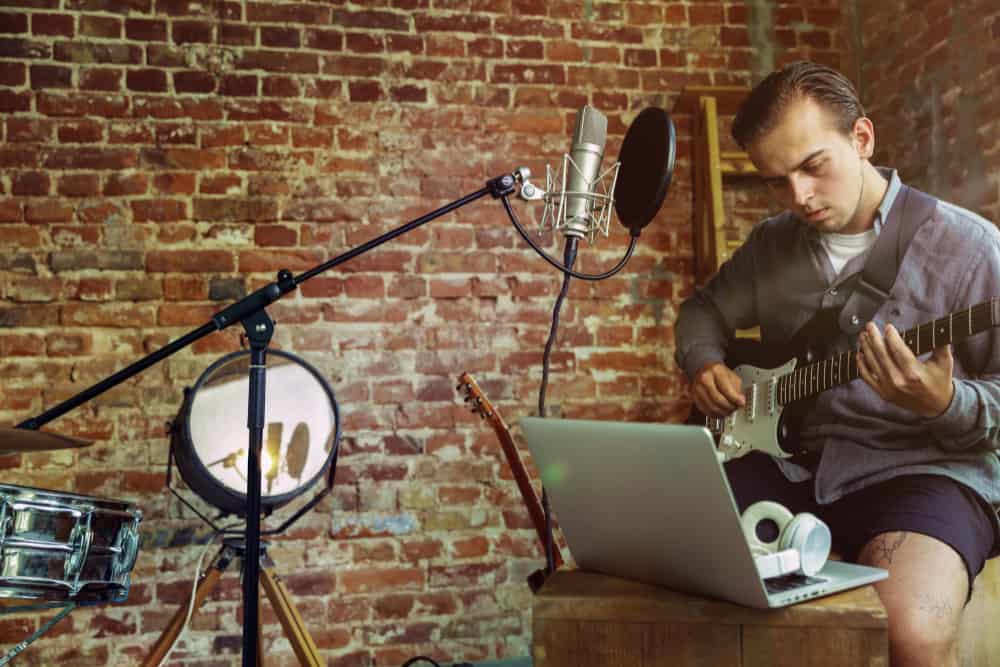
Maybe inside YouTube or on another platform, there are well-structured courses that will take you from zero to hero if you follow along and practice at home.
If you are willing to put in the hours and do your homework one of these courses will be a great alternative to get you started.
My recommendation is that you don’t go crazy looking for the perfect one. Any will do. You just need someone to show you the primordial stuff and then you will most likely earn the tools to keep paving your way.
3. Playing over songs
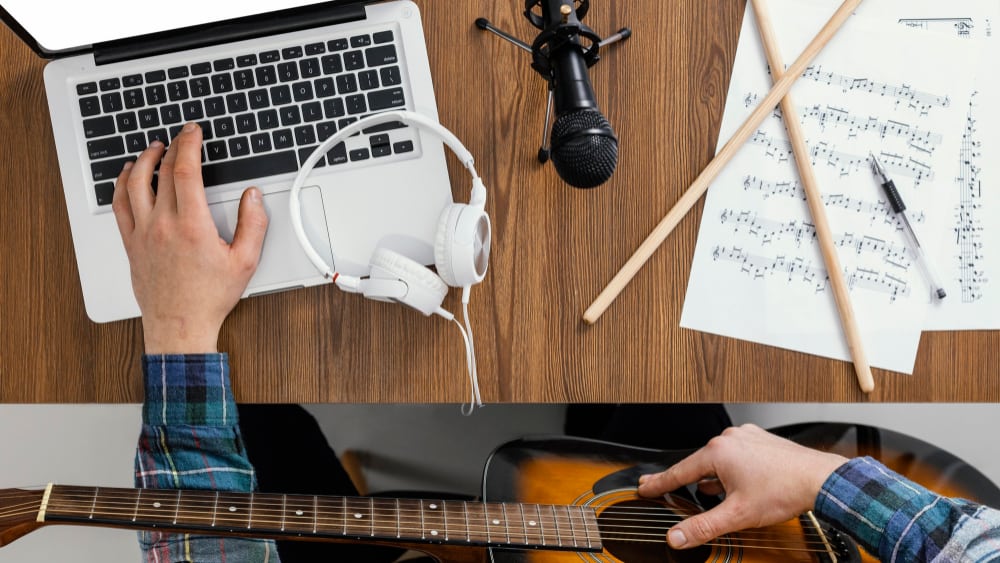
This is how most guitar legends learned to play, and it is one of the least popular methods nowadays.
The availability of courses and tutorials that take your hand and guide you from day one makes for this alternative almost unheard of.
But back in the day, there was pretty much no other choice. You just had to listen to your favorite songs and try to figure them out by ear.
This is absolutely torture for beginners, but if you have the patience and put in the extra work, this method will put you a step ahead.
By doing this you will develop a strong ear that will allow you to figure out just about any song on the spot, and you will teach yourself how to get different sounds from the instrument in order to match the ones you are hearing.
4. Books

I think of guitar books as more of a complement. I’m not that sure if you could completely get it by just reading. However, for some people, a well-detailed guide on paper is better than a tutor and I can really get it.
Go and see what does your library can offer you on this topic. I will recommend you avoid academic books or those geared to a more formal study of the instrument. You don’t need that for now.
Look for editions that don’t focus on music theory but on technique and practicality.
I’m not saying that theory is not important, I’m saying that it’s not important to you now. You probably even haven’t decided if you really like playing the guitar. Why should you be reading about scales and harmony?
There’s time for that later.
5. Tablatures and chord schemas
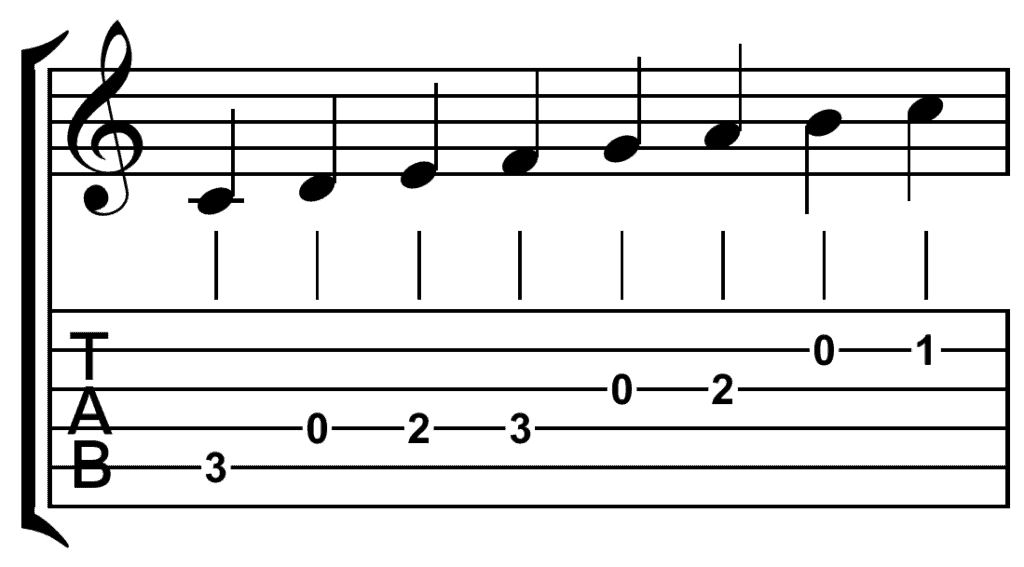
Tablatures and chord schemas are both your best friend and your worst nightmare. They are very easy to understand and so convenient. Very much so that they might turn you into a lazy guitar student.
I know about this first hand.
The availability of any guitar part on a tablature can really hurt the natural development of your musical ear and your ability to figure out songs on your own.
Why would you waste half an hour trying to find out what chords are being played in a song if you can google them in 10 seconds?
Well, I can assure you that if you just don’t google it and force yourself to get it just by listening to it, at some point, your ear will develop and it will be faster to figure it out than to look for schemas online.
However, if you just never do it and always resort to transcriptions, your ear will be stuck at a beginner level for years, even if your technique and playing are well over intermediate or advanced.
6. Having a guitar mentor

Perhaps you have a friend who plays the guitar, or an uncle, or a cousin. Whoever you can find that knows their way around this instrument will make for a good guitar mentor.
A mentor will mostly help you set realistic goals, give you feedback and prevent you from developing bad habits.
Your mentor will not be a teacher, but someone you can consult when you have any doubt about what you are doing. You don’t even have to see him regularly. Just check on him now and then, talk about your progress and ask for advice.
We, guitar players, love sharing what we know, don’t be ashamed to ask for help.
7. Starting a band

This might seem counter-intuitive since you might think you will first need to know how to play before starting a band.
Well, you might be right, but not really.
Victor Wooten, one of the world’s greatest bass players has this theory that learning how to make music is just like learning how to talk.
When you were a baby and you didn’t know any words or how to communicate you learned by imitating your parents. That imitation slowly broadened your vocabulary and allowed you to start forming sentences and going back and forth with your interlocutors.
This is how you ultimately learned how to talk, isn’t it?
And why would be playing an instrument any different? Making music is in many ways just like having a coherent conversation with your band members.
Putting yourself under pressure is also a great way to push forward.
The better the players you can play with, the richer the experience would be for a beginner.
Just give it a try and have fun. That’s what music is all about.
Here you can see Victor’s take on this one:
The best self-taught way to learn guitar
In my opinion, there is no exclusive best self-taught way to learn the guitar. I think the methodology most effective for any person will depend on their personality and compromise with the learning process.
However, if a friend approached me and I were to design a study plan for them, I would probably mix and match with the different ways I mentioned earlier.
YouTube is a great resource for learning the basics and getting to see the different techniques. An online course would be a supplement to this, but I’m not that sure if it would suit the taste of every aspiring player.
My most pressing recommendation would be to always try to figure out songs from ear and play them along. This would be a piece of advice most applicable to advanced beginners to intermediate players.
Books can be great to learn music theory, harmony, and even music production and recording. I don’t think a player could actually learn everything or even 20% of what playing the guitar means from reading.
Tablatures and chord schemas are risky. They are great at creating lazy musicians. I always recommend using them with caution. If you just want to sing a silly song to your girlfriend and you don’t have time to figure it out by yourself, go for it. But if a song really moves you, give it the time and effort it deserves, and just check the tab if you are stuck at some point.
I would like my imaginary friend to check on me on a weekly or bi-weekly basis to show me their progress. I could then act as a mentor and reinforce their virtues while correcting bad habits.
Finally, perhaps starting a band is a rather heavy idea, but having informal jam sessions, where my friend could try out their new skills will be almost ideal.
Not all of these resources might be available for you, but any combination of a subgroup will probably be. It will depend solely on you to make the most of them.
Remember, really anyone can learn the guitar.
How to learn guitar by yourself effectively
The most effective way to find real progress in your early guitar journey is to set reachable goals and to practice only the important things.
Messing around with no purpose on the guitar for 2 hours is way less effective than a 15-minute session of a specific exercise.
If your objective is to improve as a guitarist your study mix should always be biased towards specific techniques and their application.
On the other side, if you only want to have fun and just learn a few songs to sing along with your friends, focus on that.
There is, however, no magic workaround for your first weeks struggling with the instrument. You will just have to get familiar with the guitar and progress will come slowly.
I will encourage you, and I repeat it just to stress it, to define clearly what you want to achieve in your guitar journey and try to align your study with that goal.
There is no shame in just wanting to learn how to play a few chords to get girls. But if this is your dream, then don’t put yourself through an excruciating 8-week intensive course on jazz guitar. Just learn your chords from a nice YouTube tutorial and get things going.
What are the most important things to learn in the guitar to play any song?
In my opinion, the single most important thing to learn not just in the guitar, but on any instrument is how to keep rhythm.
Rhythm is the foundation of music, and with a weak base, you would never be able to build anything over it.
In most cases, for beginner players, being uncomfortable with the instrument and having poor technique is what prevents them from keeping good rhythm.
If the issue persists after some months, I would strongly advise you to get a metronome app on your phone and start practicing your drills over it. You can also look for a drum backing track on YouTube or just play along with song recordings.
But, please, learn the guitar in the context of other instruments. Don’t go for 2 years without ever ensembling your playing with other people’s music. It doesn’t matter if it’s a recording or you can get to play with your friends.
Music is an interactive art and you have to learn how to work with other people’s sound.
Besides rhythm, you should learn your basic chords and scales, but don’t neglect to learn songs that you like.
Having fun is the most important thing if you want to be a long-term guitar player.
How much music theory do you need to learn when learning to play guitar by yourself?
I don’t think absolute beginners really need to know anything about music theory. They should focus their first weeks on getting comfortable with the instrument. After this annoying period, I would start with chords, and just learning the difference between major and minor. Scales would come up next naturally.
Intervals and more advanced chords might be helpful to get started with harmony, but as with everything else, I think the depth of music theory needed will depend on the player.
Ask yourself just how deep you want to go. If you want to be a jazz guitarist, you better start reading now. If you want to play punk, learn your 4 chords and be happy.
There’s no right or wrong way. Many amazing players don’t know anything about theory and still make amazing music.
Do I recommend ignoring completely one of the core approaches and ways to understand the instrument you love? Absolutely not. Music theory will give you freedom and expand your toolbox for when creativity meets a dead end.
In no way knowing your way around advanced harmony could ever hinder your ability to create innovative new pieces of music. That is just an excuse lazy players make.
Music theory won’t put you into a predetermined box, it will help you understand what the boundaries of that box are and how to push them.
Why most people don’t recommend a self-taught approach to guitar?
I think most people have a certain restrain on recommending you go the self-taught route because they don’t really understand the current availability of resources a modern guitar newbie has at its disposal. It’s not like it was 20 years ago. You can nowadays get better lessons online than anywhere else.
The most “serious risk” of teaching yourself how to play is developing bad habits, but this is not that terrible and can be fixed easily if diagnosed on time.
Try to at least find someone to check on your progress now and then and guide you when you get stuck on something.
Other than this, just play man. Nobody died of learning the guitar as far as I know.
How long would it take to learn guitar by yourself?
How long would it take to learn the guitar will absolutely depend on what you consider this means. I would say that objectively, you will be a beginner for 3 months, then an intermediate player of varying degrees for your first 2 years of playing, and after that, you could be considered an advanced player.
This timeline is not absolute and it will be different for everyone, but it is possible for almost anyone to learn the guitar in this timeframe if they just put on the hours.
Could you become an advanced player faster? Absolutely, perhaps you practice for 8 hours a day or you are really gifted. We, mortals, need more time, usually.
Does this mean that after 2 years of playing the guitar I will be the greatest that ever was? Absolutely not. Being an advanced player, in my opinion, just puts you in a basic level of competency. From here on you are on your own and you will have to make your own way and find your own voice.
You will start understanding, as you get better, how incredibly talented are your guitar heroes and how hard it is to perform at that level.
What is the fastest way of learning guitar alone?
There are no real shortcuts for learning the guitar. However, the fastest way will be setting up realistic goals and focusing on what it takes to achieve those goals. If your goal is to play a certain song start by slowing everything down and chopping it into parts. Learn the parts separately and then put them all together.
Don’t rush. Slow everything down. Build up muscle memory and the fast parts will eventually happen in your fingers naturally.
Practice effectively. Don’t play without a purpose if you want to improve every day. Focus on intense but short exercise sessions.
Don’t spread yourself thin, if you want to learn songs get them done one after the other. Never start learning 5 at the same time.
Finally, and as though it sounds cheesy, have fun. If playing the guitar becomes a chore you would never improve, and even if you do, what makes you think that it would be more fun then?
Which guitar would be better for a self-taught beginner?
The best guitar for a self-taught beginner is the one they can have. Whether it is an acoustic, an electric, if it costs $5000 or $50, the most important thing to learn is to just get your fingers working. I don’t think a better or more expensive one would help the learning process.
Many players will argue that it is best to start with an acoustic before switching to an electric, but I don’t know where this opinion comes from. Actually, I think the electric guitar is easier to play for absolute beginners.
Don’t overthink it, if you have to buy a guitar, just get anyone from a respectable brand. After a few months if you discover that you prefer another kind of guitar you can easily get rid of it. Beginner instruments are easier to resell.

Hello there, my name is Ramiro and I’ve been playing guitar for almost 20 years. I’m obsessed with everything gear-related and I thought it might be worth sharing it. From guitars, pedals, amps, and synths to studio gear and production tips, I hope you find what I post here useful, and I’ll try my best to keep it entertaining also.

